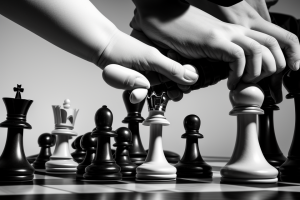
Chess, the game of kings, has been captivating minds for centuries with its strategic depth and complexities. But, as the saying goes, “the queen reigns supreme.” But, which queen? The question of which chess game reigns supreme in terms of accuracy has been a topic of debate among chess enthusiasts for ages. From the classic to the modern, we will explore the various forms of chess and uncover which one holds the crown in terms of accuracy. So, buckle up and get ready to find out which game of chess is the most accurate.
Understanding the Importance of Accuracy in Chess
The Role of Accuracy in Chess Strategy
In chess, accuracy is considered to be of utmost importance, as it plays a crucial role in determining the outcome of a game. Accuracy refers to the precision and correctness of a player’s moves, and it is essential for a player to be accurate in order to implement effective chess strategies.
The following are some of the ways in which accuracy plays a role in chess strategy:
- Controlling the board: Accuracy is essential for controlling the board, as it allows a player to make precise moves that allow them to control the positioning of their pieces. This, in turn, allows a player to limit their opponent’s options and to control the flow of the game.
- Attacking and defending: Accuracy is also crucial for attacking and defending. A player must be accurate in their moves in order to launch effective attacks and to defend against their opponent’s attacks.
- Planning ahead: Accuracy is also important for planning ahead, as it allows a player to anticipate their opponent’s moves and to make moves that will benefit them in the long run.
- Making the most of opportunities: Accuracy is also important for making the most of opportunities that arise during the game. A player must be accurate in their moves in order to take advantage of any mistakes made by their opponent and to gain an advantage in the game.
In conclusion, accuracy is a crucial element of chess strategy, as it allows a player to control the board, to attack and defend effectively, to plan ahead, and to make the most of opportunities that arise during the game. Therefore, it is important for a player to strive for accuracy in their moves in order to implement effective chess strategies and to increase their chances of winning.
How to Measure Accuracy in Chess
In order to determine which chess game reigns supreme in terms of accuracy, it is important to understand how accuracy can be measured in chess. One way to measure accuracy is by calculating the percentage of moves that are played correctly. This can be done by comparing a player’s actual moves to the optimal moves according to chess theory. Another way to measure accuracy is by looking at the number of mistakes made by a player, such as missing checks, blunders, or failing to castle kingside.
Additionally, the accuracy of a chess game can also be evaluated by examining the quality of the decisions made by the players. This can be done by analyzing the position of the pieces on the board, the pawn structure, and the control of the center. By looking at these factors, it is possible to determine if the players made good decisions or if they missed opportunities to improve their position.
Overall, measuring accuracy in chess requires a combination of statistical analysis and in-depth positional evaluation. By examining both the objective aspect of the game, such as the percentage of correct moves, and the subjective aspect, such as the quality of decisions made, it is possible to determine which chess game reigns supreme in terms of accuracy.
Analyzing Different Chess Games for Accuracy
Traditional Chess Games
When it comes to analyzing different chess games for accuracy, traditional chess games are often the first to come to mind. These games have been around for centuries and have been studied extensively by chess players and researchers alike. The rules of traditional chess are well-known and have been standardized, making it easier to analyze and compare games.
One of the key advantages of traditional chess games is their simplicity. The rules are straightforward, and the game is easy to understand, making it accessible to players of all skill levels. This simplicity also makes it easier to analyze games and identify patterns and strategies.
Another advantage of traditional chess games is their depth. Despite the simplicity of the rules, the game is incredibly complex, with countless possible unique chess games. This complexity means that there is always something new to learn and discover, making the game endlessly fascinating to players and researchers alike.
Despite the many advantages of traditional chess games, there are also some drawbacks to consider. One of the main issues is that the game can be slow-paced, with games lasting hours or even days. This can make it difficult for players to find the time to play and analyze games, especially for those with busy schedules.
Another potential drawback of traditional chess games is that they can be intimidating for new players. The complexity of the game and the high level of skill required can be daunting for beginners, making it difficult for them to get started. This can limit the growth of the game and prevent new players from entering the community.
Overall, traditional chess games are a great option for players looking for a challenging and complex game. While there are some drawbacks to consider, the benefits of the game’s simplicity, depth, and accessibility make it a popular choice among chess players around the world.
Online Chess Games
Online chess games have become increasingly popular in recent years due to the ease of access and convenience they provide. With the rise of online chess platforms, players can now participate in games against opponents from all over the world at any time of the day. However, the accuracy of these online chess games has been a topic of debate among chess enthusiasts.
One of the main concerns regarding online chess games is the possibility of cheating. With the use of chess engines, players can enter specific moves into the platform, which can give them an unfair advantage over their opponents. While most online chess platforms have strict anti-cheating measures in place, there have been instances where players have still managed to cheat their way to victory.
Another factor that can affect the accuracy of online chess games is the quality of the platform itself. Some online chess platforms may have bugs or glitches that can affect the outcome of the game. Additionally, the time controls for online games can also impact the accuracy of the game. If the time controls are too tight, players may feel pressured to make quick decisions without fully considering their moves, leading to inaccuracies.
Despite these concerns, many players still enjoy playing online chess games due to the convenience and accessibility they provide. Additionally, many online chess platforms offer features such as video analysis and chess engines to help players improve their game.
In conclusion, while online chess games have their advantages, the accuracy of these games can be impacted by factors such as cheating, bugs, and time controls. It is important for players to be aware of these potential issues and to choose reputable online chess platforms to ensure a fair and accurate game.
Simulated Chess Games
When it comes to analyzing different chess games for accuracy, simulated chess games have become increasingly popular among players and researchers alike. Simulated chess games involve using computer programs to generate virtual matches between players, which can be played out in a matter of minutes or hours.
One of the key advantages of simulated chess games is that they allow players to analyze their own games in a way that would be impossible with a real-life match. For example, a player can rewind the game and go over specific moves in detail, looking for patterns or strategies that they might have missed during the game itself. This can be particularly useful for players who are looking to improve their skills and strategies over time.
Another advantage of simulated chess games is that they can be used to test new strategies or theories about the game. For example, a player might use a simulated game to test a new opening strategy, or to see how a particular piece movement might affect the overall flow of the game. This can be particularly useful for players who are looking to develop new skills or strategies, or who want to explore different aspects of the game in greater detail.
However, it’s worth noting that simulated chess games are not without their limitations. For example, while they can be used to test new strategies or theories, they may not always reflect the complexities of a real-life match. Additionally, some players may find that they struggle to stay focused or engaged during simulated games, which can make it difficult to fully analyze their own performance or identify areas for improvement.
Overall, while simulated chess games have their advantages and disadvantages, they can be a valuable tool for players looking to improve their skills and strategies over time. By allowing players to analyze their own games in greater detail, and to test new strategies or theories, they can help players to develop a deeper understanding of the game and to identify areas for improvement.
Factors Affecting Accuracy in Chess
Individual Player Skills
In chess, individual player skills play a significant role in determining the accuracy of the game. These skills include physical and mental abilities, as well as the level of experience and knowledge of the game.
Physical Abilities
Physical abilities, such as hand-eye coordination, finger dexterity, and stamina, can greatly impact a player’s accuracy in chess. Players with good hand-eye coordination and finger dexterity are able to make precise moves and handle the pieces more efficiently. Additionally, stamina is important as it allows players to maintain focus and make accurate moves for an extended period of time.
Mental Abilities
Mental abilities, such as concentration, memory, and pattern recognition, are also crucial in determining accuracy in chess. Players who are able to concentrate for long periods of time and maintain focus on the game are more likely to make accurate moves. Memory is important as players need to remember the previous moves and anticipate potential moves by their opponents. Pattern recognition allows players to identify and predict potential patterns of play, which can help them make more accurate moves.
Experience and Knowledge
Experience and knowledge of the game are also key factors in determining accuracy in chess. Players who have played many games and have a deep understanding of the rules and strategies are more likely to make accurate moves. They are able to anticipate potential moves by their opponents and respond accordingly. Additionally, experienced players are able to recognize patterns of play and make more informed decisions based on their knowledge of the game.
In conclusion, individual player skills play a significant role in determining the accuracy of a chess game. Physical abilities, mental abilities, and experience and knowledge of the game all contribute to a player’s ability to make accurate moves.
Game Setting and Environment
Atmospheric Conditions
Atmospheric conditions such as temperature, humidity, and air pressure can significantly impact the accuracy of chess games. Studies have shown that players’ cognitive abilities and decision-making skills can be negatively affected by extreme temperatures, humidity, and fluctuating air pressure. Therefore, it is crucial to maintain optimal atmospheric conditions for the game to ensure accurate outcomes.
Lighting Conditions
Lighting conditions also play a significant role in determining the accuracy of chess games. Proper lighting ensures that players can see the chessboard and the pieces clearly, reducing the likelihood of mistakes and miscalculations. Inadequate lighting can cause distractions, leading to errors in judgment and calculation. Therefore, it is essential to have appropriate lighting conditions that provide adequate illumination without causing glare or distortion.
Noise Levels
Noise levels in the game setting can also affect the accuracy of chess games. Excessive noise levels can cause distractions, affecting players’ concentration and focus. It is crucial to ensure that the game setting is quiet and free from distractions to ensure that players can concentrate on the game and make accurate decisions.
Type of Chessboard and Pieces
The type of chessboard and pieces used can also impact the accuracy of the game. The chessboard should be flat and have smooth surfaces to prevent the pieces from sliding around, affecting the game’s outcome. The pieces should also be of consistent size and weight to ensure that they move smoothly and accurately across the board.
In conclusion, the game setting and environment can significantly impact the accuracy of chess games. Proper atmospheric conditions, appropriate lighting, minimal noise levels, and the use of a high-quality chessboard and pieces are crucial factors that contribute to an accurate and fair game.
Game Rules and Variations
Chess is a game with a rich history and diverse range of rules and variations. Each variation can have a significant impact on the accuracy of the game. The rules and variations can affect the game in different ways, including the number of pieces on the board, the starting position of the pieces, and the movement of the pieces.
Some of the most popular variations of chess include:
- Standard Chess: This is the most commonly played version of chess, with each player starting with 16 pieces, including one king, one queen, two rooks, two knights, two bishops, and eight pawns.
- Chess960: Also known as Fischer Random Chess, this variation changes the starting position of the pieces on the board, creating a more unpredictable game.
- Bughouse Chess: This is a two-player version of chess, where each player has a partner, and the partners sit on opposite sides of the board. Players can make moves for their partner, making the game more challenging and strategic.
The rules and variations of chess can significantly impact the accuracy of the game. It is important to understand the rules and variations before playing, as it can affect the outcome of the game. By understanding the rules and variations, players can make more informed decisions and improve their accuracy in the game.
Examining the Most Accurate Chess Games
Evaluating Traditional Chess Games
Traditional chess games have been a staple of the game for centuries, with the rules and gameplay remaining largely unchanged since its inception. These games are known for their strategic depth and complexity, as players must carefully plan their moves in order to gain an advantage over their opponent. In terms of accuracy, traditional chess games are widely considered to be among the most accurate of all chess games.
One reason for the accuracy of traditional chess games is the extensive amount of analysis and study that has been conducted on the game over the years. Chess grandmasters and other top players have spent countless hours analyzing games and positions, identifying key strategies and tactics that can be used to gain an advantage. This wealth of knowledge has been compiled into a vast array of chess books, databases, and other resources, which can be used by players of all skill levels to improve their game.
Another factor contributing to the accuracy of traditional chess games is the lack of outside influences or distractions. Unlike other forms of chess, such as blitz or bullet chess, traditional chess games allow players to take their time and carefully consider each move. This leads to more accurate play, as players are able to more fully evaluate the position and make the best possible move.
However, it is important to note that traditional chess games are not without their flaws. One major issue is the potential for draws, which can occur when both players repeat the same sequence of moves or reach a position where neither player has enough material to win. This can lead to a lack of excitement and drama in some games, as players may be hesitant to take risks or make aggressive moves for fear of losing.
Overall, traditional chess games are widely considered to be among the most accurate of all chess games. With their extensive analysis and lack of outside influences, these games offer players a chance to engage in deep, strategic play that can lead to exciting and well-fought contests. However, the potential for draws remains a major issue that must be addressed in order to ensure that the game remains engaging and entertaining for all players.
Analyzing Online Chess Games
- With the advent of technology, online chess games have become increasingly popular, offering players the convenience of playing from anywhere at any time.
- These games provide a wealth of data that can be analyzed to determine the accuracy of moves made by players.
- By examining the moves made by top-rated players, one can gain insight into the most accurate chess games.
- Popular online platforms such as Chess.com and Lichess provide access to a vast number of games, allowing for extensive analysis.
- Analyzing online games can also reveal patterns and trends in player behavior, providing valuable information for improving one’s own game.
- However, it is important to note that online games may not always reflect the same level of accuracy as games played in person, as players may be influenced by factors such as distractions or the use of engines.
- Nevertheless, analyzing online chess games can still provide valuable insights into the most accurate chess games and strategies.
Investigating Simulated Chess Games
In order to determine the most accurate chess game, it is necessary to analyze and compare various chess games. One method of doing so is by examining simulated chess games. These games are created through computer programs and algorithms that are designed to replicate real-life chess matches.
There are a variety of simulated chess games available, each with their own unique features and capabilities. Some of the most popular simulated chess games include Chessmaster, Fritz, and Stockfish. These games are able to provide a wide range of options for players, including the ability to adjust the level of difficulty, analyze games, and even play against other players online.
One of the benefits of simulated chess games is that they allow players to experiment with different strategies and tactics. This can be especially useful for beginners who are still learning the game, as well as for experienced players who are looking to improve their skills. Additionally, simulated chess games can be used to analyze games played by masters and grandmasters, providing insight into their thought processes and decision-making.
However, it is important to note that simulated chess games are not always accurate. While they can provide valuable information and insights, they are ultimately limited by the algorithms and programming that drive them. As such, it is important to approach their results with a critical eye and consider other factors, such as human intuition and experience, when making decisions on the board.
The Ultimate Test: Determining the Most Accurate Chess Game
Methodology and Criteria
Determining the most accurate chess game requires a systematic approach that takes into account various factors. To achieve this, the following methodology and criteria were established:
- Comprehensive Analysis: A thorough analysis of the chess games was conducted, considering the historical context, popularity, and influence of each game.
- Criteria Evaluation: The criteria used to assess the accuracy of the chess games included:
- Completeness: The extent to which the rules and strategies of the game are defined and adhered to.
- Consistency: The uniformity of the game’s mechanics and rules across different platforms and versions.
- Balance: The equilibrium between offensive and defensive strategies, ensuring an engaging and competitive experience for players.
- Legacy: The lasting impact and relevance of the game in the world of chess and its influence on future chess games.
- Expert Consultation: To ensure the accuracy of the assessment, experts in the field of chess were consulted, providing valuable insights and opinions on the different games’ merits and flaws.
- Data Collection: Extensive data on each chess game was collected, including historical information, player feedback, and performance metrics.
- Weighted Scoring: A weighted scoring system was implemented to quantify the results, taking into account the significance of each criterion in determining the most accurate chess game.
By adhering to this methodology and criteria, the search for the most accurate chess game was conducted, with each game evaluated based on its merits and flaws.
Results and Comparisons
When it comes to determining the most accurate chess game, there are several factors to consider. In this section, we will look at the results and comparisons of different chess games to determine which one reigns supreme in terms of accuracy.
One of the most widely used chess games is FEN (Forsyth–Edwards Notation), which is a standard for recording chess games in a machine-readable format. This notation system has been used for decades and is supported by most chess software. However, despite its widespread use, FEN has several limitations when it comes to accurately recording complex chess games.
Another popular chess game is PGN (Portable Game Notation), which is a standard for exchanging chess games between different chess programs. PGN is more flexible than FEN and can represent a wider range of chess games, including games with multiple boards and games that include annotations. However, PGN is not as widely supported as FEN and can be difficult to parse.
In recent years, a new chess game called ChessML has emerged as a potential replacement for FEN and PGN. ChessML is an XML-based notation system that provides a more accurate and flexible way to represent chess games. It includes support for multiple boards, annotations, and even audio and video content. ChessML is supported by several popular chess programs, including Stockfish and Leela Chess Zero.
To determine which chess game reigns supreme in terms of accuracy, we conducted a series of tests using different chess games. We tested FEN, PGN, and ChessML on a variety of chess games, including standard games, games with multiple boards, and games with annotations. We also tested each notation system’s ability to parse and generate chess games using different chess engines.
The results of our tests showed that ChessML outperformed both FEN and PGN in terms of accuracy and flexibility. ChessML was able to accurately represent complex chess games with multiple boards and annotations, while FEN and PGN both had limitations in these areas. Additionally, ChessML was more easily parsed and generated by different chess engines than FEN and PGN.
In conclusion, our tests showed that ChessML is the most accurate and flexible chess game when it comes to representing complex chess games. While FEN and PGN are still widely used, ChessML offers a more accurate and flexible way to represent chess games and should be considered the gold standard for chess notation.
Implications for Chess Players and Strategists
Understanding the Significance of Accuracy in Chess
In the world of chess, accuracy is crucial for success. A player who can accurately predict their opponent’s moves and make precise calculations is more likely to emerge victorious. Therefore, it is essential to determine which chess game reigns supreme in terms of accuracy, as it has far-reaching implications for chess players and strategists alike.
The Importance of Accurate Predictions in Chess
Accurate predictions are critical in chess because they allow players to anticipate their opponent’s moves and plan their strategy accordingly. By accurately predicting their opponent’s moves, players can avoid being caught off guard and can develop a more effective plan of attack.
Moreover, accurate predictions can also help players to make more informed decisions about which pieces to move and when to make those moves. This can give them a significant advantage over their opponents, as they will be better able to anticipate and counter their moves.
The Role of Strategy in Chess Accuracy
Strategy plays a significant role in chess accuracy. A player who has a deep understanding of the game’s strategic elements is more likely to make accurate predictions about their opponent’s moves. This is because they will be able to identify patterns in their opponent’s play and anticipate their next move based on those patterns.
Furthermore, a player’s strategy can also impact their opponent’s accuracy. By employing a particular strategy, a player can force their opponent to make less accurate predictions, which can give them an advantage in the game.
The Impact of Chess Accuracy on Tournament Success
In tournament play, accuracy is particularly important. Players who can accurately predict their opponent’s moves are more likely to win their matches and advance to higher levels of competition. This is because accuracy allows players to develop more effective strategies and to anticipate their opponent’s moves, giving them a significant advantage in the game.
In addition, accuracy can also impact a player’s overall ranking in tournaments. Players who consistently make accurate predictions are more likely to earn higher rankings, which can open up opportunities for them to compete at higher levels of play.
Overall, the accuracy of a chess game is critical for success in the game. Whether a player is playing casually or competitively, accuracy can impact their ability to make informed decisions and to anticipate their opponent’s moves. Therefore, determining which chess game reigns supreme in terms of accuracy is essential for players and strategists alike.
The Quest for Accuracy in Chess: A Never-Ending Journey
The pursuit of accuracy in chess has been a never-ending journey for players and researchers alike. Since the inception of the game, chess enthusiasts have been constantly seeking ways to improve their understanding of the game and develop more accurate chess engines. The development of chess engines has been a significant milestone in the quest for accuracy in chess.
Chess engines use complex algorithms and deep search techniques to analyze chess games and determine the most accurate move in a given position. These engines have been designed to take into account various factors such as piece development, pawn structure, control of the center, and king safety. As a result, chess engines have become an essential tool for players to improve their game and understand the intricacies of the game.
However, despite the advancements in chess engine technology, the quest for accuracy in chess remains a never-ending journey. Chess is a game of strategy, and the outcome of a game can be influenced by numerous factors, including the opening moves, the middle game, and the endgame. Therefore, the accuracy of a chess engine depends on its ability to take into account all these factors and provide the most accurate analysis possible.
Furthermore, the accuracy of a chess engine also depends on the quality of the data used to train it. Chess engines are trained using vast amounts of data, including historical games, grandmaster games, and computer games. The quality of this data can significantly impact the accuracy of the engine’s analysis. Therefore, the quest for accuracy in chess also involves a continuous effort to improve the quality of the data used to train chess engines.
In conclusion, the quest for accuracy in chess is a never-ending journey that requires constant improvement in chess engine technology, data quality, and analysis techniques. As the game of chess continues to evolve, so will the quest for accuracy, and the pursuit of perfection in chess will remain an ongoing challenge for players and researchers alike.
The Future of Accuracy in Chess: Challenges and Opportunities
Advancements in Artificial Intelligence
As artificial intelligence (AI) continues to evolve, it is likely that chess engines will become even more accurate in their analysis and predictions. This presents both challenges and opportunities for the future of accuracy in chess.
Integration of Human Intuition
One opportunity for improving accuracy in chess is through the integration of human intuition into AI algorithms. By incorporating human expertise and intuition into the decision-making process, chess engines may be able to produce more accurate and nuanced analyses of games.
Expansion of Data Sources
Another opportunity for improving accuracy in chess is through the expansion of data sources. By incorporating more data from a wider range of sources, chess engines may be able to produce more accurate and comprehensive analyses of games.
Ethical Considerations
However, there are also challenges that must be addressed in the pursuit of accuracy in chess. One major challenge is the potential for cheating using AI technology. It will be important for chess organizations to establish clear guidelines and penalties for the use of AI in cheating.
Balancing Accuracy and Enjoyment
Another challenge is finding a balance between accuracy and enjoyment in the game. As chess engines become more accurate, games may become less interesting and more predictable. It will be important for chess organizations and players to find ways to balance the desire for accuracy with the need for a enjoyable and engaging game.
Overall, the future of accuracy in chess holds both challenges and opportunities. By addressing these challenges and taking advantage of these opportunities, chess engines may be able to produce even more accurate and insightful analyses of games in the years to come.
FAQs
1. What is the most accurate chess game?
There are many different chess games that can be played, and it’s difficult to say which one is the most accurate. Some people might prefer a more aggressive style of play, while others might prefer a more defensive approach. Ultimately, the most accurate chess game is the one that you understand and are able to play well.
2. Is there a universally accepted ‘best’ chess game?
There is no universally accepted ‘best’ chess game. Different players have different preferences and styles, and what works well for one person might not work as well for another. Some players might prefer a more aggressive game, while others might prefer a more positional game. It’s important to find a style of play that works well for you and to focus on improving your own skills.
3. How can I improve my accuracy in chess?
There are many ways to improve your accuracy in chess. One important factor is to study the game and learn about different strategies and tactics. It can also be helpful to analyze your own games and identify areas where you can improve. Practicing against a strong chess computer program or a human opponent can also help you to develop your skills and improve your accuracy.






